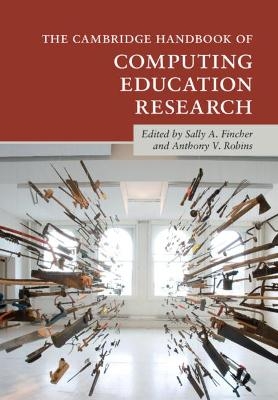
The Cambridge Handbook of Computing Education Research
Cambridge University Press (Verlag)
978-1-108-49673-5 (ISBN)
This Handbook describes the extent and shape of computing education research today. Over fifty leading researchers from academia and industry (including Google and Microsoft) have contributed chapters that together define and expand the evidence base. The foundational chapters set the field in context, articulate expertise from key disciplines, and form a practical guide for new researchers. They address what can be learned empirically, methodologically and theoretically from each area. The topic chapters explore issues that are of current interest, why they matter, and what is already known. They include discussion of motivational context, implications for practice, and open questions which might suggest future research. The authors provide an authoritative introduction to the field which is essential reading for policy makers, as well as both new and established researchers.
Sally A. Fincher is Professor of Computing Education in the School of Computing at the University of Kent, Canterbury, where she leads the Computing Education Research Group. She is also an ACM Distinguished Scientist, a UK National Teaching Fellow, a Senior Fellow of the UK Higher Education Academy, and a Fellow of the Royal Society of Arts. Anthony V. Robins is Professor of Computer Science at the University of Otago, New Zealand. He is also Associate Journal Editor of Computer Science Education, and has co-organised multi-national research studies. He has worked for the Ministry of Education, New Zealand, on new programming assessment standards and related instructional materials for secondary schools.
An important and timely field Sally A. Fincher and Anthony V. Robins; Part I. Background: 1. The history of computing education research Mark Guzdial and Benedict du Boulay; 2. Computing education research today Sally A. Fincher, Josh Tenenberg, Brian Dorn, Christopher Hundhausen, Robert McCartney and Laurie Murphy; 3. Computing education: literature review and voices from the field Paulo Blikstein and Sepi Hejazi Moghadam; Part II. Foundations: 4. A study design process Amy J. Ko and Sally A. Fincher; 5. Descriptive statistics Patricia Haden; 6. Inferential statistics Patricia Haden; 7. Qualitative methods for computing education Josh Tenenberg; 8. Learning sciences for computing education Lauren E. Margulieux, Brian Dorn and Kristin A. Searle; 9. Cognitive sciences for computing education Anthony V. Robins, Lauren E. Margulieux and Briana B. Morrison; 10. Higher education pedagogy Kerry Shephard; 11. Engineering education Michael C. Loui and Maura Borrego; Part III. Topics: Section 1. Systemic Issues: 12. Novice programmers and introductory programming Anthony V. Robins; 13. Programming paradigms and beyond Shriram Krishnamurthi and Kathi Fisler; 14. Assessment and plagiarism Thomas Lancaster, Anthony V. Robins and Sally A. Fincher; 15. Pedagogic approaches Katrina Falkner and Judy Sheard; 16. Equity and diversity Colleen M. Lewis, Niral Shah and Katrina Falkner; Section 2. New Milieux: 17. Computational thinking Paul Curzon, Tim Bell, Jane Waite and Mark Dorling; 18. Schools (K-12) Jan Vahrenhold, Quintin Cutts and Katrina Falkner; 19. Computing for other disciplines Mark Guzdial; 20. New programming paradigms R. Benjamin Shapiro and Mike Tissenbaum; Section 3. Systems Software and Technology: 21. Tools and environments Lauri Malmi, Ian Utting and Amy J. Ko; 22. Tangible computing Michael Horn and Marina Bers; 23. Leveraging the IDE for learning analytics Adam Carter, Christopher Hundhausen and Daniel Olivares; Section 4. Teacher and Student Knowledge: 24. Teacher knowledge for inclusive computing learning Joanna Goode and Jean J. Ryoo; 25. Teacher learning and development Sally A. Fincher, Yifat Ben-David Kolikant and Katrina Falkner; 26. Learning outside the classroom Andrew Begel and Amy J. Ko; 27. Student knowledge and misconceptions Colleen M. Lewis, Michael J. Clancy and Jan Vahrenhold; 28. Motivation, attitudes and dispositions Alex Lishinski and Aman Yadav; 29. Students as teachers and communicators Beth Simon, Christopher Hundhausen, Charlie McDowell, Linda Werner, Helen Hu and Clif Kussmaul; Section 5. Case Studies: 30. A case study of peer instruction Leo Porter and Beth Simon; 31. A case study of qualitative methods Colleen M. Lewis.
| Erscheinungsdatum | 03.04.2019 |
|---|---|
| Reihe/Serie | Cambridge Handbooks in Psychology |
| Zusatzinfo | Worked examples or Exercises; 13 Tables, black and white; 3 Halftones, black and white; 50 Line drawings, black and white |
| Verlagsort | Cambridge |
| Sprache | englisch |
| Maße | 181 x 259 mm |
| Gewicht | 1820 g |
| Themenwelt | Schulbuch / Wörterbuch |
| Geisteswissenschaften ► Psychologie ► Allgemeines / Lexika | |
| Geisteswissenschaften ► Psychologie ► Pädagogische Psychologie | |
| Sozialwissenschaften ► Pädagogik ► Allgemeines / Lexika | |
| ISBN-10 | 1-108-49673-3 / 1108496733 |
| ISBN-13 | 978-1-108-49673-5 / 9781108496735 |
| Zustand | Neuware |
| Haben Sie eine Frage zum Produkt? |
aus dem Bereich


